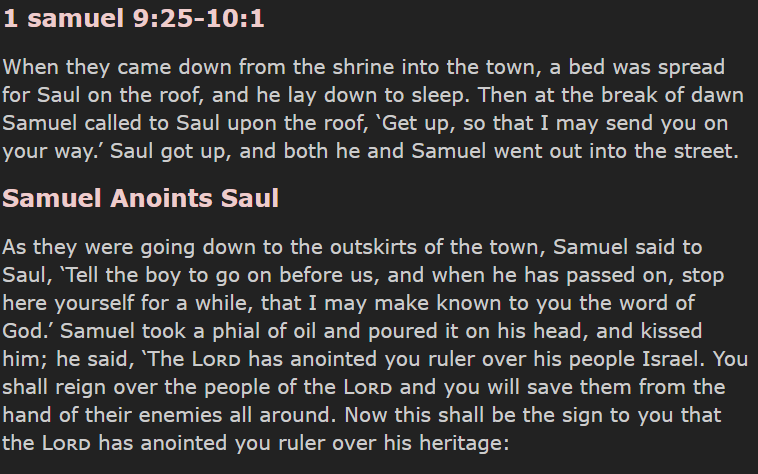Observation: The people of Israel have lived under judges for centuries. Now they have asked God for a human king, like other nations have. After giving them a stern warning that kings are more trouble than they're worth, the prophet Samuel concedes. God reveals to him Saul, from the house of Benjamin. In this scene, Samuel privately anoints Saul as king over Israel, to "reign over the people of the Lord and save them from the hand of their enemies all around." This anointing with oil was an important part of the coronation of kings from then on (I know it continues to be practiced in the coronation of European kings and queens to this day. You can see this dramatized in the Netflix series "The Crown.") Anointing with oil symbolizes God's mandate for a ruler to reign in God's name, for the good of the people.
Anointing is a very important part of Christian theology, as well. "Christ" is not Jesus' last name, but rather his title. It is Greek for "anointed". In Hebrew the word is "Messiah." And to those who believe in Jesus, it means he is God's chosen ruler of the people of Israel, and God's world.
Application: It's kind of strange to refer to myself as "anointed," but since I'm baptized, that's what I am. We are anointed with oil after our baptism, to show that we too are connected to Christ, tasked with "ruling" in his name. But if you know Jesus, you know this simply means we serve and love others in his name. Unlike King Saul, who quickly let power go to his head, the power we receive from Christ at our anointing should be humbling. It means we have a duty to live in this world, and fully engage in our communities as ambassadors for Christ, our king. It means we have authority to speak boldly to the powerful, in defense of the powerless. And it often means taking up a cross, as Jesus did, rather than use our power and privilege to defend ourselves. It's awesome, in the true sense of the word. But in the colloquial sense, it does not always feel awesome. To quote a favorite movie, "with great power comes great responsibility."
Prayer: Jesus Christ, anointed king, I have been anointed in your name. I didn't do anything to deserve it, and apart from your Spirit, I do not have the gifts to live up to it. But because you have chosen me, help me and equip me to live as your ambassador. In your name I pray, Amen.


